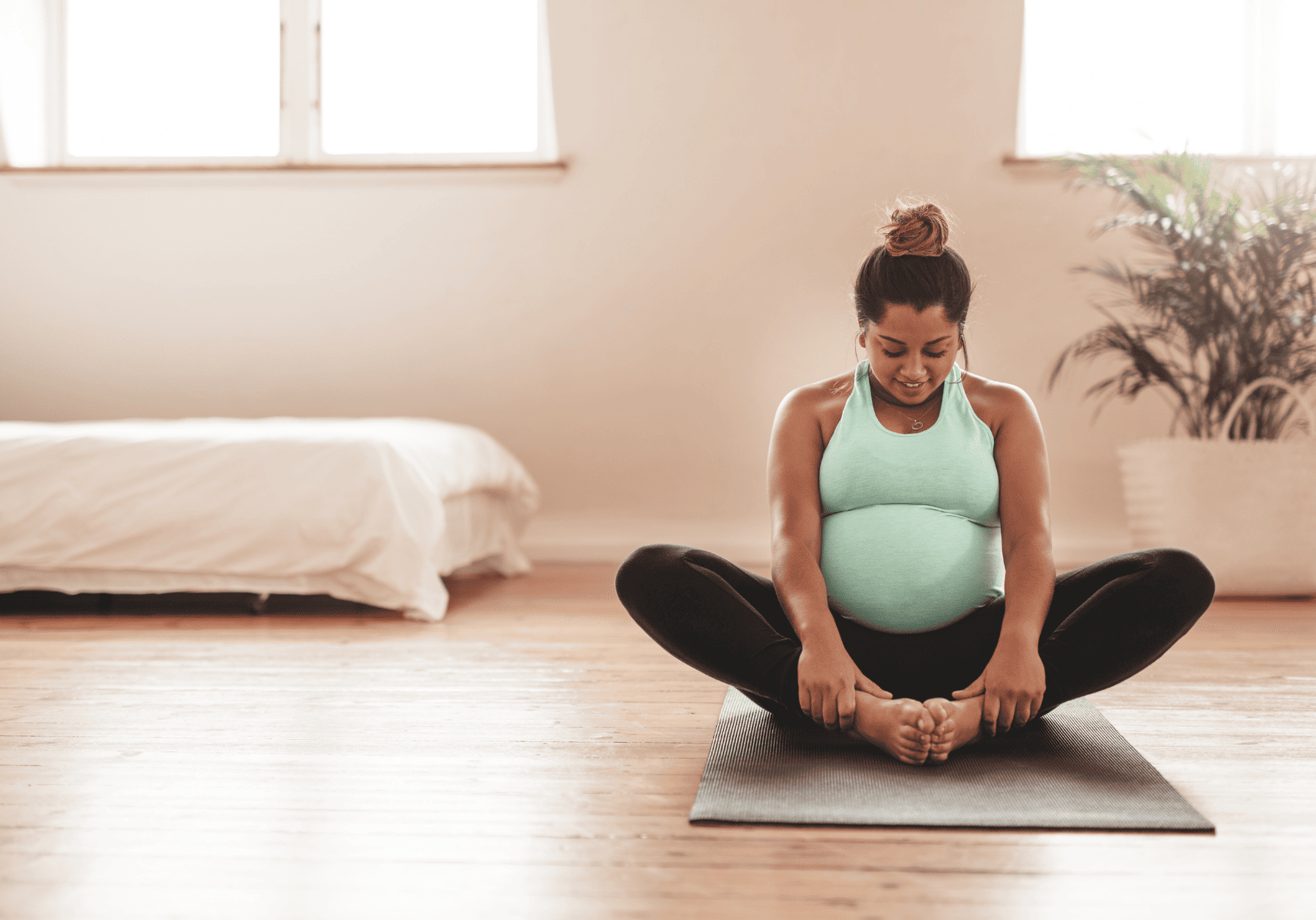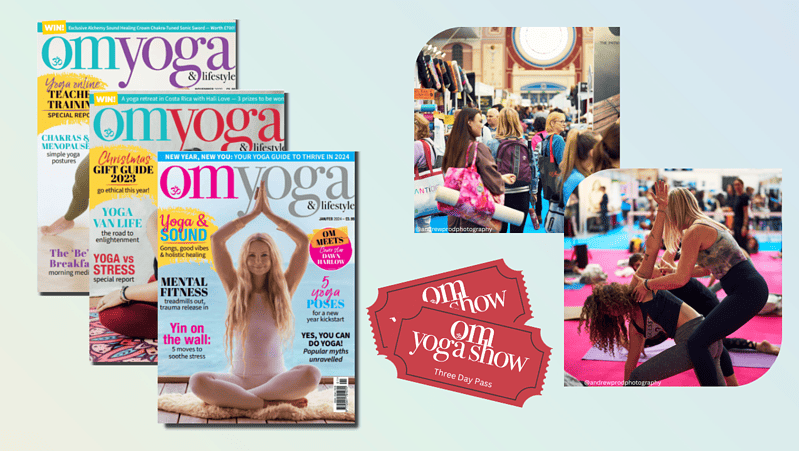
A Bump in The Pose
Should we be doing more for our Pregnant Participants? - By Lizzie Emly
Reading time: 5 minutes
Ah pregnancy. I will never fail to remember the astonishment I felt when I realised my body and this baby were doing their thing. With no conscious input from me, they were just getting on - the baby growing, my body changing and accommodating. If it had lived up to my expectations it should have been lovely. Of course, I knew how lucky I was to be carrying this baby, but here was my body, doing the most natural thing in the world, and yet it felt like the most unnatural thing in the world.
I had assumed pregnancy* would be a happy and uneventful experience, one in which I would attend yoga in the room I had seen set up, softly lit with blankets and bolsters in preparation for the pregnancy class. I was, let’s say, a little naive.
When at 32 weeks pregnant I finally waddled into the studio, I introduced myself to the teacher. I meant to say ‘Hi, I’m lizzie, I’m 32 weeks and I haven’t yet been to class because of a few complications, but I now have the doctors green light to do yoga’. Instead, I believe the drivel that came out of my mouth went something like ‘Hi, I’m 32 weeks and I’ve had a horrible pregnancy. I am losing my mind with worry, I’ve been having scans every week and I haven’t bought a single thing for the baby yet because I still don’t believe they will be coming home with me.I hate the fact my body is unrecognisable, I thought I’d love it but I hate it and I hate the way I look. And I feel terrible guilt for feeling that because I know that I am very lucky to be pregnant.’
Understandably, the shell-shocked expression on the face of the speechless teacher confirmed to me that I had lost the plot. The teacher, I might add, was an excellent teacher and it was by no means her responsibility to listen to my crazed outburst.
However, much as I enjoyed and benefitted from the classes I attended over the following two months, I couldn’t help but feel there was a subtle insinuation about the way pregnancy should be. Pregnancy is natural, we were reminded. We were not ‘ill’, and labour is a ‘process’. There were discussions about oxytocin and the occasional mention of hypnobirthing in the context of breathing for contractions. All completely relevant, valid and important. But was it enough?
True, pregnancy is natural, no denying that. But then again nature can be harsh. While not an illness, pregnancy can certainly trigger a plethora of health conditions, as any mum who has developed gestational diabetes, hypertension or preeclampsia will tell you. As for medical intervention in labour, I for one am grateful that modern medicine has saved countless lives and there is no denying the science behind ‘the obstetrical dilemma’.
The concepts shared with us were entirely appropriate and I cannot fault the multitude of teachers who are passionate about empowering women to feel competent as they approach their due dates. But at the same time, I couldn’t help feel that the focus was heavily weighted towards one experience of pregnancy and birth, while the other, very real aspect, was somewhat neglected. Would these exercises benefit me given that I was having a planned C-section? Well yes, no doubt they would, but nobody told me that. Did it matter that I didn’t feel especially ‘connected to’ or ‘proud of’ or happy about my changing body?
Well, no, it didn’t, but nobody acknowledged that either. In keeping the conversation centred on one vision of pregnancy, I couldn’t shake the niggling feeling that my experience was indicative of failure.
According to The Royal College of Obstetricians and Gynaecologists, one in five women will have problems with their mental health in the perinatal period, with the most common of these being depression and anxiety. The WHO states that of those affected by perinatal mental health conditions, 20% will have suicidal thoughts or thoughts of self-harm. Pregnancy is a time of enormous transition, and while the arrival of any new life is a celebration, overlooking or downplaying the physical and emotional toll can lead to disastrous consequences for women whose experience does not live up to the expectation.
Furthermore, with maternal age increasing and the knock on effect that has on the health and monitoring of mothers and babies, it’s more important than ever that women are given strategies to help them cope with the anxiety provoked by extra appointments, screenings and sophisticated ultrasound diagnostics. Yoga is a fantastic opportunity to provide a calm space and to act as an antidote to the stresses of pregnancy, and it follows therefore that looking after the most vulnerable mums-to-be should matter as much as looking after those who have a more predictable experience.
So, with that in mind, could we be doing more to recognise and validate everyone’s experience? I believe the answer is that we could and we should. We could start by taking subtle (if unintentional) judgements out of the equation. Yes, talk about breathing for labour but C-section births account for 30% of births, and breathing throughout a C-section is important too.
A C-section doesn’t equal failure nor does it necessarily warrant sympathy. For the parent ‘to be’ that desperately wanted a water birth but whose breech baby requires caesarean delivery, of course, share their disappointment. However, for the one who has requested a C-section because it is what they want, congratulate them on their courage to speak up for what they feel is right for them.
When referencing ‘baby’, perhaps consider language that would work for women who don’t feel emotionally connected to their pregnancy. Sometimes just swapping the word ‘baby’ for ‘stomach' once or twice throughout class could be a relief for some participants, and it’s OK to remind the class that while many people bond with their baby in pregnancy, others feel it for the first time after the birth. Some people take many months to feel an emotional bond with their baby and that’s ok.
As teachers or participants, can we find ways to uphold our own values about pregnancy* and birth without undermining someone else’s, perhaps different, opinion? Crucially, remaining cognisant that things change is of utmost importance. There will always be births that go to plan, and births that don’t - which way it goes ultimately has very little to do with how ‘good’ someone is at birthing. Surely, then it is wise to promote adaptability and strategies for coping when plans change.
Wouldn’t it be wonderful if all mums could be made to truly feel adequate, regardless of how accepting they feel towards their changing body, regardless of how much pain relief they plan to have and regardless of how they choose to give birth (or end up giving birth). We need to reiterate that they are enough. There is no superior way to bring a new life into the world, perhaps we could be doing more to acknowledge that.
*commission earned from this link






